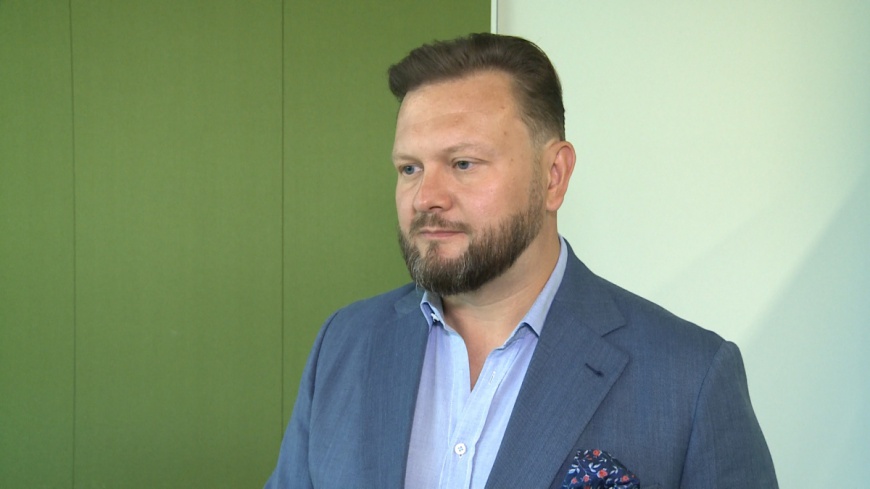| Says: | Piotr Przewrocki, Publico24 Jarosław Sokolnicki, Microsoft Polska |
A Polish start-up intends to revolutionise the distribution of the press. The new subscription-based model is similar to that of Netflix.
Publico24 has created a model for the digital distribution of the press, based on subscriptions, resembling Netflix. Thanks to small transmitters installed in public places, readers with an app installed on their mobile phones can have unlimited access to their favourite papers or individual articles The service is free for readers, and the subscription cost is covered by businesspeople or owners of venues, for whom this is an opportunity to expand their range of services. The company is already working on providing access to the digital press for individual users based on monthly subscriptions.
For several years the press market has been going through a crisis, manifesting itself in the decreasing circulation of magazines and revenues from advertising. Publico24, one of the start-ups selected in Microsoft's acceleration programme, has an opportunity to address this issue.
“In the case of other media, such as film and music, the revolution of their distribution model has already taken place. Now it's time for the press. Customers have become enthusiasts of subscriptions and of the way they can access content within this model. I think the same will apply to the press,” Jarosław Sokolnicki from Microsoft Poland told the Newseria Biznes news agency.
The new Publico24 company has created a model for the digital distribution of the press, based on subscriptions, resembling Netflix. The solution is based on an app using beacons – small radio signal transmitters communicating with smartphones and other devices with Internet access. The app connects with them through Bluetooth or WiFi and receives free access to more than 50 press titles from the digital newsstand's range. Everyone who is close to the beacon (and up to 2 hours after disconnecting) can read a selected paper on their phones or tablets; the HTML5 technology ensures adjustment of the content to the specific format and device. In turn, the Microsoft Azure technology ensures user data security.
Beacons can be placed in cafés, hairdresser's salons, waiting rooms, and even in municipal transport vehicles. For readers the service is cost-free, and the subscription cost is covered by businesspeople or owners of venues, for whom this is an opportunity to expand their range of services.
“We have introduced a press distribution model based on beacons for commercial facilities, cafés and hospital waiting rooms – every place where people wait for services. Briefly speaking, the venue's owner pays for our access to the press. And the fee is low. This will revolutionise the way we read the press. The same has already been achieved for the distribution of music through Spotify, for films through Netflix, and for books thanks to Amazon Prime and Legimi in Poland. Now it's our turn with papers. The subscription model similar to that for Netflix is what the market has been waiting for. This is the way people want to use the press, the want to have access to several hundred titles for a low subscription fee,” said Piotr Przewrocki from Publico24.
“Restaurant owners will use the service to attract people to their place, and customers have an opportunity to catch up with the latest press news while waiting for their meal. There's a benefit for everyone,” Jarosław Sokolnicki added.
Publico24 is a virtual newsstand and a universal tool for creating digital newspaper issues. It lowers the costs and reduces the time, which is an aid for publishers planning to launch their own digital distribution channels. The platform can also be used by bloggers, who will be able to use it for distributing their content to a broader audience. The app made by the Polish start-up has already seen its first implementations.
“The market's response has been enthusiastic. For three months our beacons have been available in the SoCoffee chain and in the buses belonging to the Flixbus chain (previously Polski Bus). Thanks to this, people can enjoy digital press while they travel,” Piotr Przewrocki said.
The app creators are working on its development on the basis of artificial intelligence and the block-chain technology. In the nearest future Publico24 is also planning to launch access to the digital press for individual users, based on a monthly subscription fee. This will enable users to access a full range of newspapers, magazines and other content without the necessity of subscribing each title individually.
“Poles have become enthusiasts of subscriptions. As in the case of music, where we usually have one or two favourite tracks of a given artist, in papers we usually read only one or two articles from a given title. Now users will be able to choose any of the several dozen titles available on the Publico range. This is a game-changer in the way consumers read the press,” Jarosław Sokolniski emphasised.
Trade

Polish consumers are more satisfied than Americans, with the customer satisfaction level being close to 80 percent
For six years the customer satisfaction index in Poland has grown by over 17 percentage points to nearly 78 percent, and it currently exceeds the customer satisfaction levels recorded in the USA and the United Kingdom. Service quality and its growing significance among businesses have had a tremendous impact on customer satisfaction. For the eleventh time the Customer Service Quality Star titles have been awarded to entrepreneurs recording the best results in this field.

